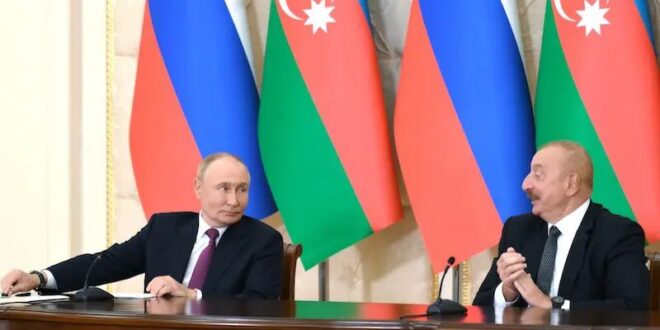As Armenia and Azerbaijan have engaged in talks about a peace treaty regarding their border dispute, Baku has been quietly but definitively turning away from the West. Azerbaijan has been closely linked with the West since the 1990s, due to its oil reserves and location as a bridge to Central Asia, as well as its role as a counterweight to Iran.
Now, Baku is developing closer relations with Russia and Iran, two countries with which it has often been in conflict. This shift was underscored last month when Russian President Vladimir Putin visited Baku and signed a wide range of economic and political accords that have led Azerbaijan to expand cooperation with the Russian government across the board. Some of the benefits for Baku were highlighted when Moscow sharply criticized Armenia for its unwillingness to re-open the Zangezur/Syunik corridor between Azerbaijan proper and the Azerbaijani exclave of Nakhchivan (Kavkaz-uzel.eu, August 19; Casp-geo.ru, September 3).
Meanwhile, Iran recently elected an ethnic Azerbaijani as president, and Tehran has continued to promote a passage through Iranian territory as an alternative to the Zangezur/Syunik corridor (Realtribune.ru, September 3). Moscow commentators, in recent days, have celebrated these developments as a sign that “Baku is making a sharp turn toward Moscow and Tehran.” They claim that as a result, the West will not be in a position to use the South Caucasus as “a second front” against Moscow (Svpressa.ru, September 4).
Whether Azerbaijan will maintain this orientation for long, as both Moscow and Tehran hope, will depend on whether Baku decides to shift its foreign policy alignment again, something for which President Ilham Aliyev’s commitment to a balance leaves plenty of room.
Baku, Moscow, and Tehran all have compelling reasons for finding common ground (see EDM, July 7, December 12, 2023, February 22). Azerbaijan has been furious at the West in general and France in particular for its support of Yerevan in its negotiations with Baku as well as for Western criticism of human rights violations in Azerbaijan. Baku sees the expansion of north-south trade between Russia and Iran as benefiting itself both economically and politically (Kavkaz-uzel.eu, December 26, 2023, September 4).
That interest has only increased as Baku and Yerevan’s talks may be nearing their end game in signing a peace treaty. Given that the two countries have decided not to resolve the issue of reopening transit routes in such an accord, Azerbaijan certainly has an interest in having Moscow and possibly even Tehran on its side to address the issue in the future, either by allowing Baku to take control of Zangezur or offering an alternative route between Azerbaijan proper and Nakhchivan via Iran (Vestikavkaza.ru, August 30; Riddle Russia, September 2).
Moscow and Tehran have equally important interests for seeking to improve ties with Azerbaijan. Russia wants, first and foremost, to limit Western influence in the South Caucasus, which would give Moscow a freer hand not only in Azerbaijan but in Armenia and Georgia as well (Svpressa.ru, September 4). For its part, Tehran wants to ensure that Baku will not increase its interest in the large ethnic Azerbaijani population of Iran, as Azerbaijani leaders, including Ilham Aliyev, have in the past (see EDM, December 1, 6, 2022; Window on Eurasia, December 1, 2022).
Iran also hopes to pull Baku away from its close ties with Israel, ties that Tehran fears might be used in the event of a Western attack on the Islamic Republic, and to avoid instability on its own borders that either foreigners or Iranian citizens might exploit (see EDM, April 18, 2023, March 27; Realtribune.ru, September 3).
Perhaps most importantly, at least for the immediate future, both Russia and Iran see improving ties with Azerbaijan as helping them cement their burgeoning economic and political cooperation, a development that helps both countries escape their current international isolation (see EDM, March 27). Azerbaijan is critical to this effort because it offers a far shorter and better developed trade route between Russia and Iran than do longer and less developed railways and highways through Central Asia or transit via the Caspian Sea, given limitations in shipping and especially intermodal port capacity in both countries (see EDM, June 7, 2023).
All three countries thus have an interest in the latest position Baku has adopted, in which the interests of Moscow and Tehran are strategic and long-term, and those of Azerbaijan are almost certainly more tactical. Due to its location and since gaining independence in 1991, Azerbaijan has been committed to a balanced foreign policy rather than an approach that links the country permanently to any outside country or group of countries. In practice, this has meant that relations between Baku and other countries have been on a roller coaster. Over the past decade alone, for example, Azerbaijan’s relations with Iran have been close to war, and then months later have become far warmer. Baku’s ties with both Moscow and the West have gone up and down more than once, despite much talk on both sides about agreements that will stand the test of time or conflicts that appeared beyond resolution.
Something similar may very well happen again. While Baku has compelling interests in expanding ties with both Russia and Iran and thus reducing links with the West, it also has many independent interests that point in the opposite direction. Consequently, Baku’s current turn away from the West toward Russia and Iran may not last for long. In fact, it may end once a peace treaty is signed between Baku and Yerevan. Appearing to ignore that possibility, some in Moscow are celebrating what they hope is a shift in Azerbaijani foreign policy that will bring Baku back into the Kremlin’s orbit indefinitely. Western governments, nevertheless, will have to remain focused on Baku’s penchant for “rebalancing” its foreign policy and even work to promote another shift, especially given the long tradition of complicated and even contradictory moves on the South Caucasus chessboard.
 Eurasia Press & News
Eurasia Press & News




